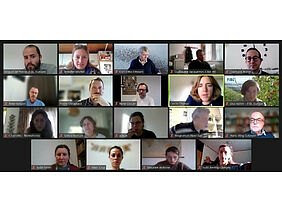In the face of climate change, crop species and agricultural practices will require adaptation in order to produce high-quality food while reducing the impact of agriculture on the environment. The main goal of BIOFAIR (BIOdiversity of soils and FArming Innovations for improved Resilience in European wheat agrosystems) is to assess the impacts of climate change and innovative farming practices on functional soil biodiversity, plant productivity and fitness as well as the nutritional quality of harvested wheat grains. The project focuses on the diverse processes in the rhizosphere of cultivated plants and the functionality of different soil organisms in a realistic simulated global change context, providing recommendations on the most suitable future agricultural practices for sustainable wheat agrosystems.
Funded by the Biodiversa Network*, coordinated by the University of Liège and with the Department of Soil Sciences of FiBL Switzerland as a partner, the project is assessing the impacts of climate change in wheat production systems. It is developing several trials across Europe simulating the climatic conditions of 2094 to assess the impact of climate change on wheat and soil biodiversity (including macro, meso and micro levels). The main task of FiBL Europe in this project is ensuring the co-construction process of the project experiments through stakeholder participation.
The External Stakeholder Board was developed after mapping key stakeholders related to soil research and wheat production in Europe. Its main objective is to advise the project in designing the experiments, discussing issues such as variety selection, soil biodiversity and nutrient management, the impact of climate change, quality aspects and policy implications. The result of these discussions will be later reflected in the project trials. The COVID restrictions made the initially planned physical meeting impossible, but they did not stop the board from successfully engaging 13 people from 9 different organisations online. The participants provided valuable insights that will be incorporated into future activities of the project.
*Biodiversa: The European Biodiversity Partnership, supporting excellent research on biodiversity with an impact for society and policy as part of the EU Biodiversity Strategy 2030.
Further information
Contact
- Miguel de Porras
- Lisa Haller
Links
- biofair.uliege.be: BIOFAIR project
- biodiversa.org: Biodiversa website




